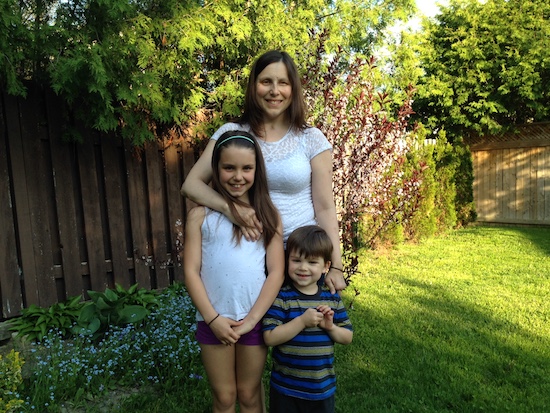Pregnancy & Parenting With Arthritis – An Interview with Laurie Proulx
At the age of fourteen, Laurie Proulx first started showing signs of Juvenile Rheumatoid Arthritis (which is now called Juvenile Idiopathic Arthritis). Today, Laurie is the mother of two children, ages 10 and 4. Her personal experiences living with arthritis led her to join the Canadian Arthritis Patient Alliance in 2004, an organization that works to provide Canadians living with arthritis with better access to medications and health care professionals, as well as increasing the level of public and political awareness about arthritis.
Laurie’s particular passion has been to spearhead a CAPA project to develop a resource on pregnancy and parenting with arthritis – one of the few comprehensive resources that currently exists on the subject. Recently, Laurie was invited to present CAPA’s resource in Madrid, Spain at the annual meeting of the European League Against Rheumatism (EULAR), a non-profit organization representing patients, healthcare professionals, and scientific societies focusing on rheumatology in Europe. I was pleased to have the opportunity to interview Laurie about her experiences at EULAR.
Mariah: Before we chat about EULAR, what originally inspired CAPA to take on the issue of pregnancy and parenting with arthritis?
Laurie: I suggested the project to CAPA and they supported my efforts. I was inspired by my own experiences and a lack of resources on the subject. Pregnancy is supposed to be a time of joy and anticipation, but when you have a chronic illness like rheumatoid arthritis it can be a time of worry and concern. There is some great work being done to systematically collect information on medications and pregnancy (for example, through Mother to Baby) but this information can be difficult to find and is often incomplete. This scarcity of information creates a lot of stress for couples. So, after having two of my own children, I wanted to help rectify this situation so others would not be as lost as I was. As a board member of CAPA, I launched a project on pregnancy and parenting with arthritis.
Mariah: Can you tell me a little bit about your project?
Laurie: The first step was to launch a survey to identify patient information needs as it relates to pregnancy and parenting with arthritis. As you can see in the survey results, the most significant concern identified by patients was medication safety during pregnancy and breastfeeding, followed by dealing with fatigue and flares and the physical care of children. Based on the results of the survey we interviewed patients with arthritis about their experiences with pregnancy and parenting, collected resources and information, and developed a resource, which has also been reviewed by two leading healthcare professionals and researchers in the field of reproductive issues, parenting, and rheumatic diseases.
Mariah: After personally experiencing a lack of resources on this subject, how does it feel to know you’ve provided other patients with information to help fill the gap?
Laurie: As a new mom I struggled with a lot of basic things because of my arthritis. Once I couldn’t get my daughter out of her swing and had a panic attack, and I hope to alleviate those types of feelings for other new parents. The resource includes lots of quotes from people who have actually lived with these issues, and my hope is that these real stories from real people will help new parents with arthritis feel less alone. It’s also very satisfying to have so many ideas and resources written down in the same place – I wanted to be sure to capture it for others before it becomes a distant memory for me, as my oldest is already ten!
Mariah: How did you end up with the opportunity to present at EULAR this year?
Laurie: I wanted to get the word out about the pregnancy and parenting resource so I submitted an abstract. I didn’t have high expectations because it is such a big conference, and thought I might be offered a poster. Instead, I was accepted to give an oral presentation. I was very happy to be accepted.
Mariah: How did your presentation go? What was it like, as a patient, to present to an audience primarily of physicians?
Laurie: EULAR is a combination of rheumatologists, nurses, and patients – and patients actually have a real place there. The conference was easily accessible from a patient point of view and patients have specific roles as part of patient organizations and presentations like mine. I had the opportunity to meet a lot of people who agreed that focusing on this topic was important work. For example, I met a woman from Moscow who would like to translate the resource into Russian.
Mariah: What’s next for CAPA and the pregnancy and parenting resource?
Laurie: I’d like to try to get rheumatologists to take this topic a bit more seriously, and really make time to discuss it with patients who are interested. Ideally I’d like rheumatologists to recommend our resource to patients who are considering pregnancy or parenthood. I have some leads to see if I can get more inroads with real life practice in the future.
Mariah: As someone with personal experience who has also done so much research on the subject, what do you think is the most important piece of advice you could give to someone living with arthritis who wants to become a parent?
Laurie: Plan as much as possible. Do your research, talk to everyone available, and figure out as much as you can in advance, which will help reduce stress. Of course, there’s only so much you can plan for – so you should still expect unexpected situations. But being informed can only help!

Join the conversation